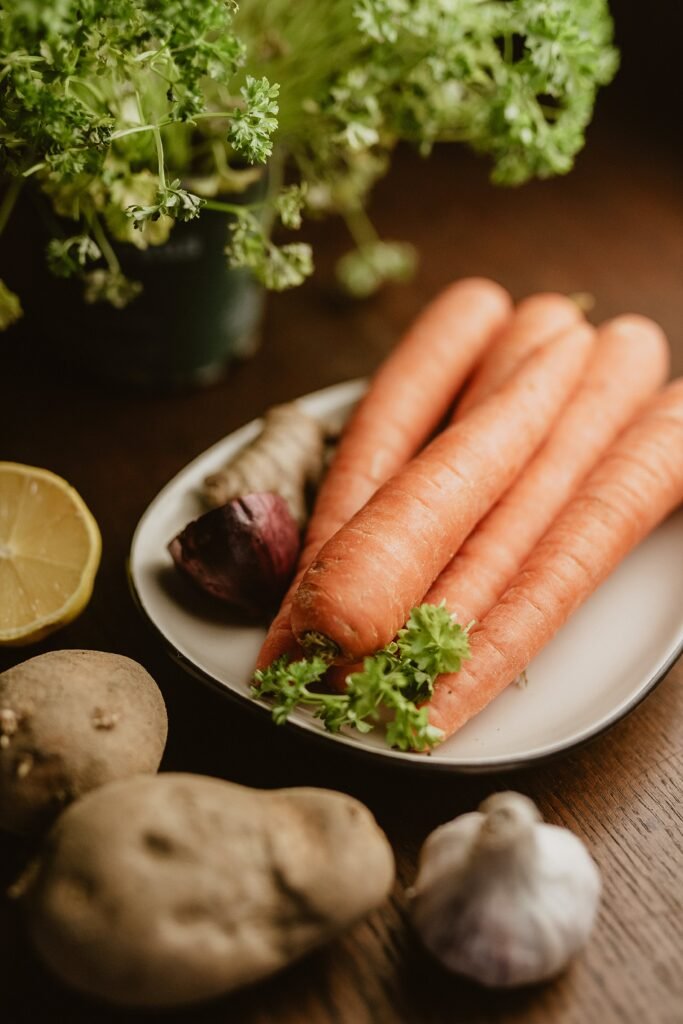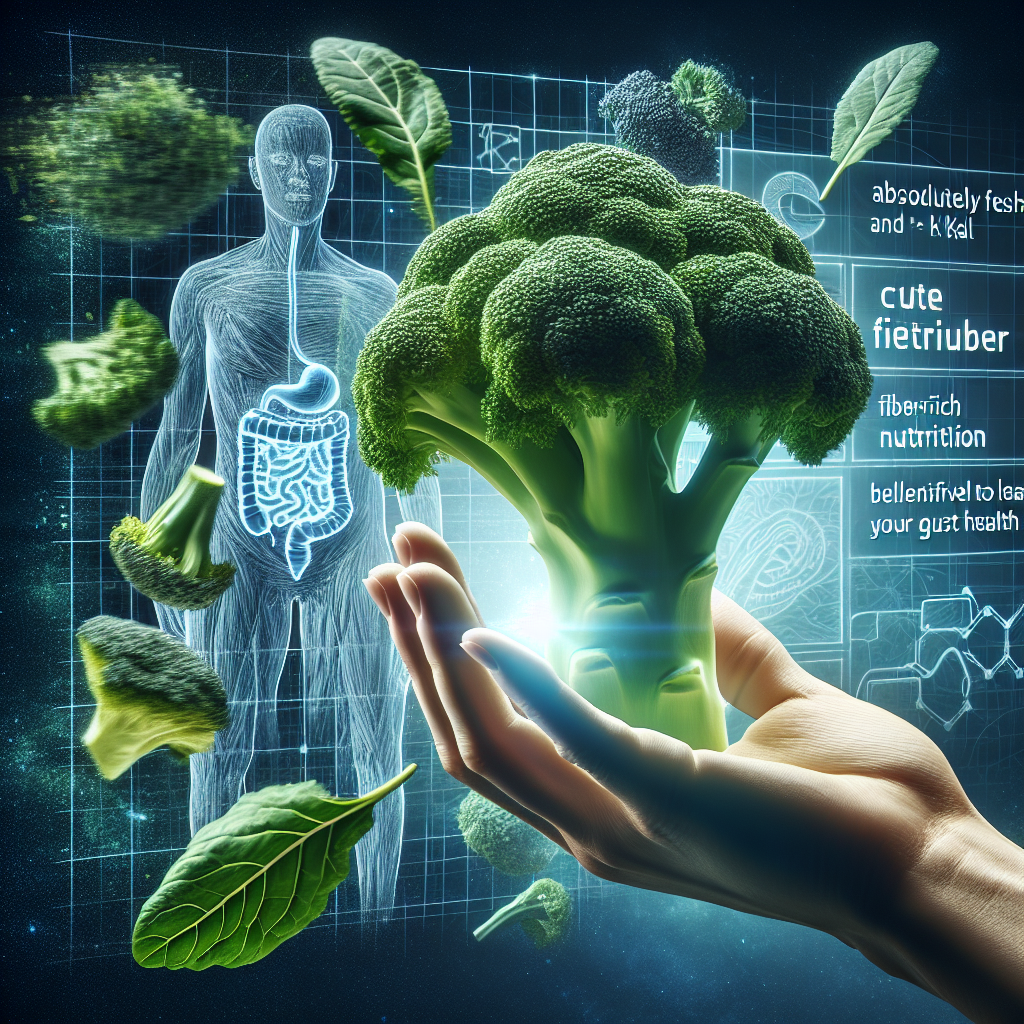Are you looking for a natural and delicious way to improve your gut health? Look no further than high-fiber vegetables! Packed with essential nutrients and fiber, these veggies can do wonders for your digestive system. From crunchy broccoli to vibrant carrots, this article will explore a variety of high-fiber vegetables and their incredible benefits for your gut. Get ready to discover a whole new world of vibrant and nutritious veggies that will keep your gut smiling!

Importance of Gut Health
Understanding gut health
Gut health refers to the overall well-being of your digestive system, specifically your gastrointestinal tract. A healthy gut plays a crucial role in your overall health and immunity. It is responsible for efficiently breaking down food, absorbing nutrients, and eliminating waste from your body. When your gut is functioning optimally, you experience better digestion, higher energy levels, and improved mood.
Role of gut bacteria
Within your digestive system, there are trillions of bacteria collectively known as the gut microbiota. These bacteria play a vital role in maintaining a balanced gut ecosystem. They help in digesting food, producing essential vitamins and nutrients, and regulating the immune system. A healthy balance of gut bacteria promotes optimal digestion, strengthens the immune system, and plays a significant role in disease prevention.
Benefits of a healthy gut
Having a healthy gut is associated with various benefits for your overall well-being. These include improved digestion, increased nutrient absorption, enhanced immune function, and decreased inflammation. A healthy gut also contributes to mental health, as the gut and brain are closely connected through the gut-brain axis. Additionally, a healthy gut can contribute to maintaining a healthy weight, reducing the risk of chronic diseases, and improving skin health.
High-Fiber Vegetables and Gut Health
What is fiber?
Fiber is a type of carbohydrate that cannot be digested by the human body. It passes through the digestive system largely intact, providing numerous health benefits. There are two main types of fiber: soluble and insoluble. Soluble fiber dissolves in water to form a gel-like substance and can help lower cholesterol levels and regulate blood sugar. Insoluble fiber does not dissolve in water and adds bulk to the stool, aiding in regular bowel movements.
Why is fiber important for gut health?
Fiber plays a crucial role in maintaining a healthy gut. It acts as food for the beneficial bacteria in your gut, helping them thrive and multiply. This, in turn, strengthens the gut microbiome and promotes a balanced digestive system. Fiber also adds bulk to the stool, promoting regular bowel movements and preventing constipation. Additionally, a diet rich in fiber has been linked to a reduced risk of developing certain gastrointestinal disorders, such as diverticulitis and hemorrhoids.
Recommended daily fiber intake
The recommended daily intake of fiber varies depending on age and gender. For adult women, the recommended intake is around 25 grams per day, while adult men should aim for around 38 grams per day. However, it is important to gradually increase your fiber intake and drink plenty of water to prevent any digestive discomfort.
Types of fiber
There are many high-fiber vegetables that can contribute to your daily fiber intake. These vegetables contain both soluble and insoluble fiber, providing a range of health benefits. Soluble fiber can be found in vegetables such as Brussels sprouts, artichokes, and sweet potatoes, while insoluble fiber is abundant in vegetables like broccoli, carrots, and spinach.
Top High-Fiber Vegetables for Gut Health
Broccoli
Broccoli is a cruciferous vegetable that is not only packed with vitamins and minerals but also high in fiber. One cup of cooked broccoli provides around 5 grams of fiber. It is a versatile vegetable that can be enjoyed steamed, sautéed, or roasted.
Brussels Sprouts
Brussels sprouts are a nutrient-rich vegetable that is low in calories and high in fiber. One cup of cooked Brussels sprouts contains approximately 4 grams of fiber. They can be delicious when roasted, added to stir-fries, or even incorporated into salads.
Artichokes
Artichokes are a unique vegetable known for their high fiber content. One medium-sized artichoke provides around 10 grams of fiber. They can be steamed, boiled, or even grilled for a flavorful and nutritious addition to your meals.
Carrots
Carrots are not only rich in beta-carotene but are also an excellent source of fiber. One medium-sized carrot contains around 2 grams of fiber. They can be enjoyed raw as a healthy snack, added to salads, or included in various cooked dishes.
Spinach
Spinach is a versatile leafy green vegetable that is packed with nutrients and fiber. One cup of cooked spinach provides approximately 4 grams of fiber. It can be used in salads, smoothies, or sautéed as a delicious side dish.
Kale
Kale is a nutrient-dense vegetable that is high in fiber and various vitamins and minerals. One cup of cooked kale contains around 2.5 grams of fiber. It can be enjoyed in salads, added to smoothies, or even sautéed as a nutritious and flavorful side dish.
Sweet Potatoes
Sweet potatoes are not only delicious but also a great source of dietary fiber. One medium-sized sweet potato contains approximately 4 grams of fiber. They can be baked, roasted, or mashed for a healthy and satisfying addition to any meal.
Cauliflower
Cauliflower is a versatile vegetable that is low in calories and high in fiber. One cup of cooked cauliflower provides around 3 grams of fiber. It can be enjoyed raw, steamed, roasted, or even used as a replacement for rice or mashed potatoes.
Peas
Peas are a legume rich in fiber and nutrients. One cup of cooked peas contains approximately 9 grams of fiber. They can be added to soups, stews, stir-fries, or enjoyed on their own as a delicious and nutritious side dish.
Asparagus
Asparagus is a spring vegetable known for its distinctive flavor and high fiber content. One cup of cooked asparagus provides around 4 grams of fiber. It can be grilled, roasted, or even sautéed as a delicious and healthy addition to your meals.
How High-Fiber Vegetables Support Gut Health
Promoting regular bowel movements
High-fiber vegetables contribute to regular bowel movements by adding bulk to the stool and promoting efficient digestion. This helps prevent constipation and keeps your digestive system functioning optimally.
Preventing constipation
Constipation is a common digestive issue that can lead to discomfort and other digestive problems. Consuming high-fiber vegetables helps maintain regular bowel movements, preventing constipation and promoting overall gut health.
Reducing the risk of developing hemorrhoids
Hemorrhoids are swollen blood vessels in the rectum or anus that can cause discomfort and pain. A diet rich in fiber, particularly from high-fiber vegetables, can help prevent the development of hemorrhoids by promoting regular bowel movements and reducing the strain during bowel movements.
Feeding beneficial gut bacteria
The fiber found in high-fiber vegetables serves as a prebiotic, which means it acts as food for the beneficial bacteria in your gut. By feeding these bacteria, high-fiber vegetables help maintain a healthy balance of gut microbiota, leading to better digestion and improved gut health.
Supporting a healthy gut microbiome
A healthy gut microbiome is essential for optimal gut health. High-fiber vegetables contribute to a diverse and balanced gut microbiome by promoting the growth of beneficial bacteria. This, in turn, supports overall gut health and enhances digestion and nutrient absorption.

Additional Health Benefits of High-Fiber Vegetables
Weight management
High-fiber vegetables can support weight management by promoting satiety, reducing overall calorie intake, and aiding in weight loss efforts. The fiber content in these vegetables helps you feel fuller for longer, leading to reduced food cravings and improved portion control.
Blood sugar control
Consuming high-fiber vegetables can help regulate blood sugar levels, particularly for individuals with diabetes or insulin resistance. The fiber slows down the absorption of glucose, preventing spikes in blood sugar levels and promoting stable energy levels throughout the day.
Lowering cholesterol levels
The soluble fiber found in high-fiber vegetables can help lower cholesterol levels by binding to cholesterol in the digestive system and eliminating it from the body. Regular consumption of these vegetables can contribute to improved heart health and a reduced risk of cardiovascular diseases.
Reducing the risk of certain diseases
A diet rich in high-fiber vegetables has been associated with a lower risk of developing various chronic diseases, including heart disease, type 2 diabetes, and certain types of cancer. The fiber and nutrient content in these vegetables contribute to their disease-preventing properties.
Tips for Incorporating High-Fiber Vegetables into Your Diet
Gradually increase fiber intake
To avoid digestive discomfort, it is important to gradually increase your fiber intake. Start by incorporating small servings of high-fiber vegetables into your meals, slowly increasing the portion sizes as your body adjusts.
Include a variety of vegetables
To maximize the health benefits, incorporate a variety of high-fiber vegetables into your diet. Different vegetables provide different types and amounts of fiber, as well as a range of vitamins, minerals, and antioxidants.
Cook vegetables properly
Properly cooking your vegetables can enhance their digestibility and nutrient availability. Steaming, roasting, or sautéing high-fiber vegetables can make them more palatable and easier to digest.
Try different cooking methods
Experiment with different cooking methods to keep your meals exciting and flavorful. Roasting vegetables brings out their natural sweetness, while grilling adds a smoky flavor. Incorporating different cooking methods can help you enjoy high-fiber vegetables in various dishes.
Pair vegetables with healthy fats
Adding healthy fats, such as olive oil or avocado, to your high-fiber vegetable dishes can enhance the absorption of fat-soluble vitamins and increase satiety. Healthy fats also provide additional flavor and satisfaction to your meals.
Consider juicing or blending
If you struggle to consume large quantities of high-fiber vegetables, juicing or blending them into a smoothie can be a practical option. However, keep in mind that juicing removes the fiber content, so it is important to still incorporate whole vegetables into your diet.
Be mindful of portion sizes
While high-fiber vegetables are beneficial for gut health, it is essential to consume them in appropriate portion sizes. Overconsumption of fiber can lead to bloating, gas, and other digestive discomfort. Listen to your body’s signals and adjust your portion sizes accordingly.
Stay hydrated
Increasing your fiber intake without adequate hydration can worsen digestive discomfort. Make sure to drink enough water throughout the day to keep your digestive system functioning smoothly and to support the movement of fiber through your digestive tract.

Precautions and Potential Side Effects
Gas and bloating
Consuming high-fiber vegetables in large quantities or increasing your fiber intake too quickly can lead to gas and bloating. To prevent these side effects, gradually increase your fiber intake and spread it out throughout the day. Ensuring proper hydration can also alleviate these symptoms.
Intolerance to certain vegetables
Some individuals may have specific food intolerances or sensitivities to certain high-fiber vegetables. Pay attention to how your body reacts to different vegetables and avoid those that cause discomfort or digestive issues.
Allergies
In rare cases, individuals may have allergies to certain vegetables, such as artichokes or peas. If you experience symptoms like itching, hives, or difficulty breathing after consuming a particular vegetable, seek medical attention immediately.
Interference with medication absorption
High-fiber vegetables can interfere with the absorption of certain medications, particularly those that rely on being absorbed in the digestive system. If you are on any medications, consult with your healthcare professional to ensure that there are no interactions between the vegetables and your medications.
Consulting a healthcare professional
If you have specific gastrointestinal conditions or concerns about incorporating high-fiber vegetables into your diet, it is recommended to consult with a healthcare professional or registered dietitian. They can provide personalized recommendations and guidance based on your specific needs.
Conclusion
Incorporating high-fiber vegetables into your diet is a simple and effective way to support your gut health. These vegetables provide a range of health benefits, from promoting regular bowel movements to reducing the risk of chronic diseases. By including a variety of high-fiber vegetables in your meals and following the tips provided, you can enjoy better digestive health, improved overall well-being, and a stronger immune system. Remember to listen to your body, stay hydrated, and consult with a healthcare professional if needed. Here’s to a healthier gut and a happier you!


